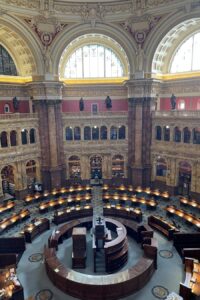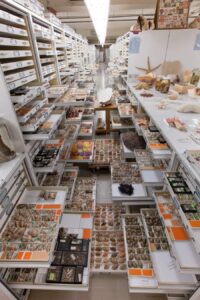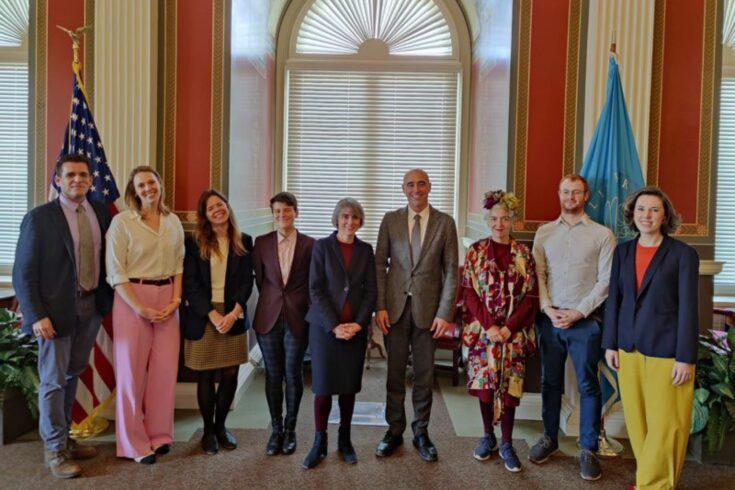IPS has been transforming the career trajectories of doctoral and early career researchers for 18 years. One of Arts and Humanities Research Council’s (AHRC) longest-running international programmes, IPS offers an annual opportunity to researchers in the early stages of their careers to develop their own projects through access to the archives and expertise of internationally renowned cultural institutions.
Over the years, IPS fellows have researched a wide variety of topics with an incredible range of disciplines and methodologies. One project funded through last year’s opportunity explored the use of fish skin in constructing garments and accessories amongst Arctic indigenous societies. Another examined the transatlantic exchange of epistemological visual cultures between the National Museum of American History and the Science Museum.
2023 scheme: now open!
The vibrant enthusiasm and stellar knowledge that applicants bring to the scheme is a continuous source of delight for both AHRC and our host institutions. We’re delighted to have recently launched the 2023 International Placement Scheme, which offers fellowships to eligible applicants at five highly prestigious cultural institutions across the US and Japan.
Before the opportunity launched, I spoke to two IPS fellows from previous rounds. Stephanie Moran finished her placement at the Smithsonian earlier this year, having spent several months in the Invertebrate Zoology Department at the Smithsonian’s National Museum of Natural History (NMNH).

The main reading room at the Library of Congress. Credit: Travis Henley
At the NMNH, Stephanie developed her PhD research into visual bias in storytelling about non-human animals – specifically freshwater mussels. Her IPS project has created a foundation which she will continue to build on after her PhD, creating interactive museums tools such as a multimedia role-playing game. This work will stimulate debate about conservation and shift perceptions of other species’ significance.
Oskar Gordon is currently working in the archives at the Library of Congress. His project investigates the relationship between manuscripts and published writings of the Harlem Renaissance.
The project adds a new dimension to his in-progress PhD on Irish modernism and its relationship to ethnography. Oskar’s work is an example of how interdisciplinary research can richly engage with literary archives, as he places literary material, print culture and ethnographic research methodologies in relation to one another.
Consolidating research, building networks and creating new opportunities
IPS provides every fellow with the opportunity to enrich their research with access to archival resources not available in the UK and to forge meaningful, lasting connections with an international community.
Oskar was only a few weeks into his placement at the Library of Congress when we spoke, but his early impressions were entirely positive.
He says:
It’s a great environment and there’s a friendly community of other researchers doing fantastic work. To pick two of the best aspects of the fellowship, I would point to being a part of this community and also the privilege of access to the vast amount of resources available which are delivered right to our desks.
Community-building is one of the key benefits of an IPS fellowship, and it expands beyond the length of the placement itself. Stephanie has been able to continue attending weekly seminars run virtually by the Smithsonian and has discussed possible future avenues with the staff who supported her placement.
When we were discussing what would happen with the parts of her archival work that didn’t make it into her thesis, she told me that:
When I’m ready to do something more with this work, the Smithsonian will support that and are totally up for collaborating on it. Without the scheme, I would never have had access to that support.
Complexities of international working
Working internationally will always come with additional challenges, and this is no different for short-term research fellowships. There is a good deal of paperwork necessary to get everything lined up, from visas to temporary accommodation.
Each IPS fellow has a triangulation of support from AHRC, their own research organisation, and the host institution; it’s important that successful applicants map this out clearly and ask key questions as early as possible, such as whether your research organisation offers health insurance for international research trips, and whether there are fee waivers in place for your particular avenue of visa application.
Oskar’s advice to future IPS fellows is to not underestimate the time these things can take, and to get your paperwork – particularly visa applications – underway as soon as possible.

Part of the Invertebrate Zoology collection at the National Museum of Natural History in DC. Credit: John Pfeiffer
Of course, the global pandemic has posed some additional difficulties to previous IPS fellows, which we very much hope will not affect successful applicants in future rounds. Stephanie ended up having to take her placement 18 months later than originally scheduled and arrived in Washington DC just before another six-week lockdown.
Despite all of these obstacles, Stephanie still managed to collect a wealth of material from the physical archives once she was able to access them. And in the meantime, she still had active support from the research group within the Invertebrate Zoology Department at the Smithsonian’s NMNH.
Stephanie’s (non-standard!) experience really highlights the multiple benefits of IPS, which are firmly not limited to the archives. She told me that even with limited physical access to the collections, she benefitted greatly from exchanging interdisciplinary knowledge and approaches with her host department, who were all trained zoologists and offered “support with reading scientific papers and understanding the context of the collection from an ecological and conservation perspective”.
Advice for prospective applicants
Oskar’s advice “would generally just be to apply, if people are unsure. For fellows applying independently, securing a place can be immensely difficult. The competition for AHRC-funded researchers is far less brutal and as long as researchers can identify specific collections, materials, and reasons for wanting to be at the host institution, they stand a very good chance of being accepted.”
Stephanie added that applicants should “research really carefully” when looking into potential host institutions. As outlined in the opportunity guidance, the Smithsonian requires applicants to identify an advisor and discuss their project before submitting an application, and Stephanie found this a crucial part of the application process. As she explains, “You want to make sure that you’ve found someone at the host institution who’s really going to be supportive of your project.”
As both Oskar and Stephanie suggested, the best thing that you can do during the application period is to really lay thorough foundations with your proposed host institution, and make sure that this is clearly articulated in your submission.
Not only does this give you a better chance of success, but if you are funded, clearly established, contextualised planning in your proposal ensures that you and your project will benefit immensely from the bespoke support offered by our host institutions.
If you are a current AHRC-funded PhD student or an early career researcher interested in applying for a fellowship at the Harry Ransom Center, Huntington Library, Library of Congress, National Institute for the Humanities, or the Smithsonian Institution as part of this year’s International Placement Scheme, please refer to the funding opportunity for full details on the application process. We also encourage you to share this opportunity with others who may be interested!
The International team would be very happy to help with any questions you might have about the scheme pre-application. You can contact us via enquiries@ahrc.ukri.org; please include ‘International Placement Scheme’ in the subject line of your email.
Top image: A group of Library of Congress staff and International Placement Scheme Fellows pose for a photo with Dame Ottoline Leyser on her visit to the Library. Credit: UKRI North America Office



